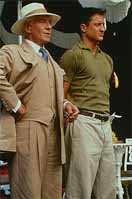 |

 |
|
|
|
Gods And Monsters
|  |
 Sir Ian McKellen is divine and Brendan Fraser is
even more divine. This small scale movie has more
impact, comedy, humanity, and power packed into it
than most of the money-making blockbusters
showing around the corner at other cinemas. From
beginning to end, it's a treat; in other words, it's a
film with some meat to it.
Sir Ian McKellen is divine and Brendan Fraser is
even more divine. This small scale movie has more
impact, comedy, humanity, and power packed into it
than most of the money-making blockbusters
showing around the corner at other cinemas. From
beginning to end, it's a treat; in other words, it's a
film with some meat to it.
(c)copyright MSVP Publicity/Paradise Entertainment Nederland

|
Christopher Bram's fictional novel, Father of
Frankenstein, which appeared on the shelves of
bookstores in 1995 proved not only an enjoyable
read of a fascinating story, but also left one with the
feeling that it would make a terrific film. Well, it has
done. It all developed from one curious and
unsolved event. In 1957 James Whale's body was
found in the swimming pool outside his home in
California, reminiscent of William Holden's body in
"Sunset Boulevard". Considering that, when he was
younger, director Whale enjoyed a somewhat
flamboyant and openly gay lifestyle, with beautiful
young boys often adorning the poolside during
nocturnal festivities and god knows what else going
on, his death left the door wide open for supposition
and rumor. Could he have enticed some attractive
piece of rough trade to his home and met his
untimely demise? (It is possible, you know. Think of
poor old Ramon Navarro.)
James Whale, for those too young to remember, was
the director of "Showboat" and "The Invisible Man"
as well as the memorable "Frankenstein" and "Bride
of Frankenstein". Executive producer Clive Barker
(yes, the one of "Hellraiser" fame) proved an
important link in bringing this project to the screen.
He has several traits in common with Whale,
including the fact that they both originally hailed from
the north of England. It is almost surprising how little
time has passed between the publication of Bram's
novel and the realization of this film project (,which
proves not only that things can be done quickly, but
extremely well when those behind the scenes have
the necessary interest, desire, dedication and
impetus to do them.)
(c)copyright MSVP Publicity/Paradise Entertainment Nederland

|
The story takes place at Whale's (Ian McKellen)
home in Pacific Palisades shortly after he has had a
stroke and returned from hospital. Whale's
housekeeper Hannah (Lynn Redgrave) has hired a
new gardener named Clayton Boone (Brendan
Fraser) for a small sum, to tend to the plants and
lawn. Once Whale sets his eyes on this towering
image of masculine beauty, he decides to begin a
conversation (about his tattoo, of all things) which is
the onset to what becomes the beginning of a
relationship. Although starting as a cat and mouse
game of ritual seduction, it soon becomes an intense
story of a platonic love. The aging director, troubled
by and fearful of his increasing loss of faculties
necessary for any quality of life, begins to focus on
the Adonis as his potential angel of death. Boone
lacks the sophistication of the older man, but begins
slowly to recognize a friend in him who can fulfill
certain inner needs. With his bulky mass, his
angular face, and his childlike naiveté, the gardener
even bears a striking resemblance to the cinematic
monster that Whale created years before.
Director Bill Condon has done a fine job of writing
the script as well as realizing it. Ian McKellen and
Brendan Fraser give flawless performances, as does
Lynn Redgrave as the housekeeper. The rest of the
cast, which includes Jack Plotnick as the humorous
starstruck student interviewer, Rosalind Ayres as
Elsa Lanchester, Jack Betts as Boris Karloff, are
equally matched. All elements of production
contribute to this fine film, but special mention
should be made of Richard Sherman's production
design and Bruce Finlayson's costume design
(which transport the viewer smoothly into the 50's
without making an obvious point of it) and Stephen
M. Katz's camerawork (which supports dramatic
action at every turn).
How much do you want to bet that "Clayton Boone"
becomes a new term in several languages?
© 1994-2006 The Green Hartnett
|
|
